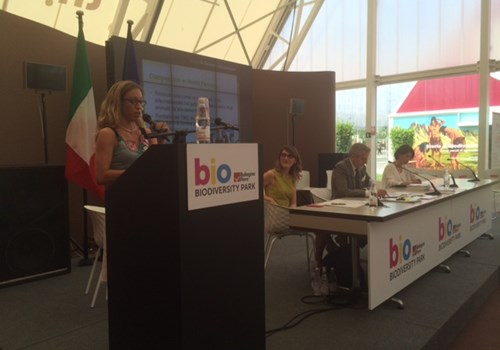Published 31/07/2015
Food safety was the core theme of the annual meeting of the Italian Biologist Association, which took place at the Milan Expo in June.
Compassion was invited to take part in one of the sessions, and speak about the link between farm animal welfare and food safety.

Compassion’s Food Business Manager in Italy, Elisa Bianco, highlighted the close link between farm animal welfare and food safety, and that higher welfare can contribute to the safety of our food. A meaningful example of this connection is well represented by the case of Campylobacter infections.
Campylobacter is a common cause of food poisoning in the EU. Reported cases of infection are around 200,000 every year but the actual number appears to be much higher, as many Member States don’t have a plan in place to monitor Campylobacter infections. An estimated 9 million people would be affected in the EU each year, costing the European economy around €2.4 billion between healthcare expenses and the loss of productivity.
Raw poultry meat contaminated with Campylobacter is often the most common source of infection. For a long time Campylobacter was viewed as a commensal bacterium, living in the gut of the bird without causing any harm. However, a growing body of evidence, shows that Campylobacter causes intestinal inflammation, mucosal damage, and changes in the bird’s gut permeability. This is leading to bacteria entering the blood stream and being found in muscles and organs after slaughter.
The genetic background of the bird is important, with high growth rate breeds having poor regulation of the inflammatory response and being negatively affected by the Campylobacter colonisation, than slower growing breeds.
Practices such as thinning, are not only bad for animal welfare but also increase the likelihood of Campylobacter colonisation.
The method of ‘thinning’ is a key contributory factor of introducing Campylobacter in the sheds. This is a fairly typical practice, where 5-7 days before de-population, around 30% of the birds are removed from a flock for slaughter at a lighter weight (~1.8kg at 33/34 days). Some sheds are thinned more than once – increasing the risk even more. From an animal welfare perspective, thinning is significantly stressful for broilers, as the birds are disturbed and handled, and subjected to food withdrawal prior to thinning.
The acute stress caused to the animals can compromise their immunity and increase their susceptibility to infections.
Scientific evidence shows that noradrenaline – produced in large quantities in the body at times of stress – can enhance the infectiousness of Campylobacter. In the presence of noradrenaline, Campylobacter shows an increase in movement and in its ability to enter the body’s cells, whilst the damages to the intestinal wall are increased by the combination of the hormone and the toxins released by the bacteria. In this way Campylobacter can pass through the gut wall and travel in blood vessels around the body – when birds are slaughtered the small capillaries in the muscles and organs of the birds may still hold the bacteria. This leads to organs such as the liver and muscles like the breast containing Campylobacter.
If we need to reduce the cases of Campylobacter infections, it is essential to acknowledge that prohibiting thinning and ensuring the use of higher welfare systems is a crucial step in guaranteeing better standards of food safety.
Click here for more information about Campylobacter monitoring.